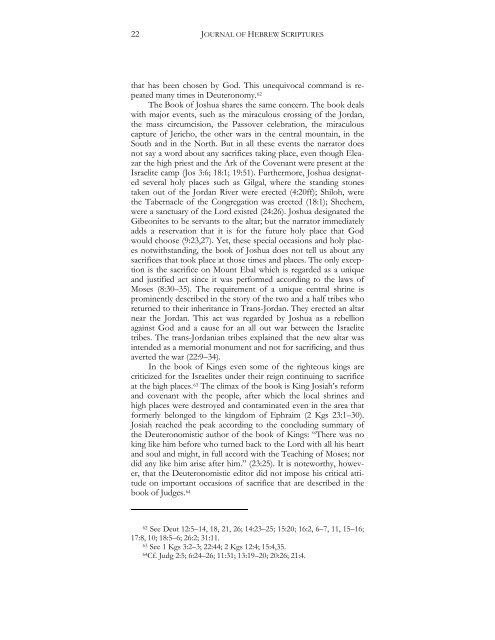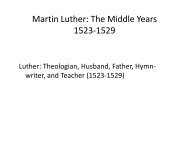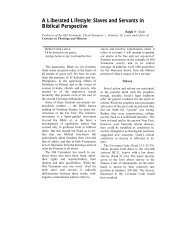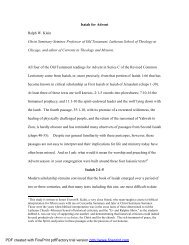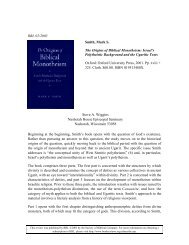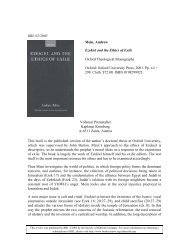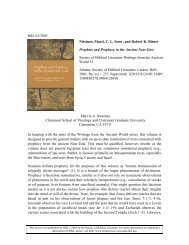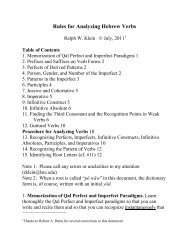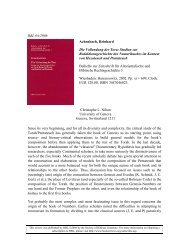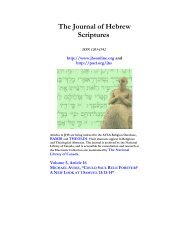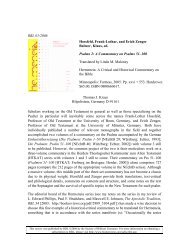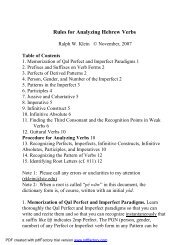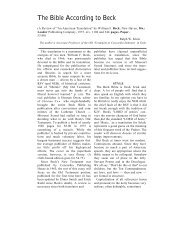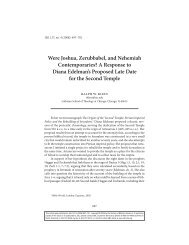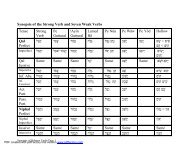The Book of Samuel: Its Composition, Structure and Significance as ...
The Book of Samuel: Its Composition, Structure and Significance as ...
The Book of Samuel: Its Composition, Structure and Significance as ...
Create successful ePaper yourself
Turn your PDF publications into a flip-book with our unique Google optimized e-Paper software.
22 JOURNAL OF HEBREW SCRIPTURES<br />
that h<strong>as</strong> been chosen by God. This unequivocal comm<strong>and</strong> is repeated<br />
many times in Deuteronomy. 62<br />
<strong>The</strong> <strong>Book</strong> <strong>of</strong> Joshua shares the same concern. <strong>The</strong> book deals<br />
with major events, such <strong>as</strong> the miraculous crossing <strong>of</strong> the Jordan,<br />
the m<strong>as</strong>s circumcision, the P<strong>as</strong>sover celebration, the miraculous<br />
capture <strong>of</strong> Jericho, the other wars in the central mountain, in the<br />
South <strong>and</strong> in the North. But in all these events the narrator does<br />
not say a word about any sacrifices taking place, even though Eleazar<br />
the high priest <strong>and</strong> the Ark <strong>of</strong> the Covenant were present at the<br />
Israelite camp (Jos 3:6; 18:1; 19:51). Furthermore, Joshua designated<br />
several holy places such <strong>as</strong> Gilgal, where the st<strong>and</strong>ing stones<br />
taken out <strong>of</strong> the Jordan River were erected (4:20ff); Shiloh, were<br />
the Tabernacle <strong>of</strong> the Congregation w<strong>as</strong> erected (18:1); Shechem,<br />
were a sanctuary <strong>of</strong> the Lord existed (24:26). Joshua designated the<br />
Gibeonites to be servants to the altar; but the narrator immediately<br />
adds a reservation that it is for the future holy place that God<br />
would choose (9:23,27). Yet, these special occ<strong>as</strong>ions <strong>and</strong> holy places<br />
notwithst<strong>and</strong>ing, the book <strong>of</strong> Joshua does not tell us about any<br />
sacrifices that took place at those times <strong>and</strong> places. <strong>The</strong> only exception<br />
is the sacrifice on Mount Ebal which is regarded <strong>as</strong> a unique<br />
<strong>and</strong> justified act since it w<strong>as</strong> performed according to the laws <strong>of</strong><br />
Moses (8:30–35). <strong>The</strong> requirement <strong>of</strong> a unique central shrine is<br />
prominently described in the story <strong>of</strong> the two <strong>and</strong> a half tribes who<br />
returned to their inheritance in Trans-Jordan. <strong>The</strong>y erected an altar<br />
near the Jordan. This act w<strong>as</strong> regarded by Joshua <strong>as</strong> a rebellion<br />
against God <strong>and</strong> a cause for an all out war between the Israelite<br />
tribes. <strong>The</strong> trans-Jordanian tribes explained that the new altar w<strong>as</strong><br />
intended <strong>as</strong> a memorial monument <strong>and</strong> not for sacrificing, <strong>and</strong> thus<br />
averted the war (22:9–34).<br />
In the book <strong>of</strong> Kings even some <strong>of</strong> the righteous kings are<br />
criticized for the Israelites under their reign continuing to sacrifice<br />
at the high places. 63 <strong>The</strong> climax <strong>of</strong> the book is King Josiah’s reform<br />
<strong>and</strong> covenant with the people, after which the local shrines <strong>and</strong><br />
high places were destroyed <strong>and</strong> contaminated even in the area that<br />
formerly belonged to the kingdom <strong>of</strong> Ephraim (2 Kgs 23:1–30).<br />
Josiah reached the peak according to the concluding summary <strong>of</strong><br />
the Deuteronomistic author <strong>of</strong> the book <strong>of</strong> Kings: “<strong>The</strong>re w<strong>as</strong> no<br />
king like him before who turned back to the Lord with all his heart<br />
<strong>and</strong> soul <strong>and</strong> might, in full accord with the Teaching <strong>of</strong> Moses; nor<br />
did any like him arise after him.” (23:25). It is noteworthy, however,<br />
that the Deuteronomistic editor did not impose his critical attitude<br />
on important occ<strong>as</strong>ions <strong>of</strong> sacrifice that are described in the<br />
book <strong>of</strong> Judges. 64<br />
62 See Deut 12:5–14, 18, 21, 26; 14:23–25; 15:20; 16:2, 6–7, 11, 15–16;<br />
17:8, 10; 18:5–6; 26:2; 31:11.<br />
63 See 1 Kgs 3:2–3; 22:44; 2 Kgs 12:4; 15:4,35.<br />
64 Cf. Judg 2:5; 6:24–26; 11:31; 13:19–20; 20:26; 21:4.


